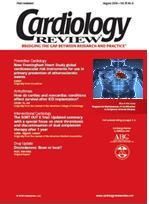Publication
Article
Cardiology Review® Online
A toast to moderate alcohol consumption
Author(s):
This month's edition of Cardiology Review kicks off with an "Images in Cardiology" case from Dr Rahul Aggarwal and colleagues from Wake Forest University Baptist Medical Center. Their case report of a patient with hypertrophic obstructive cardiomyopathy is illustrated with a variety of imaging techniques. (On a related note, this issue also features several letters to the editor generated in response to the imaging feature that appeared in our May issue.) In the stroke section, Drs Raphael A. Carandang and Philip A. Wolf describe the natural history of strokes over the past 50 years based on the pioneering work of the Framingham Study. They evaluated trends in the incidence, lifetime risks, severity, and 30-day mortality in a very large cohort (9152 persons) over the age of 55. They found that the incidence of stroke has indeed declined but that the aggressive control of risk factors must be maintained for this to continue, a conclusion with which our neurological consultant Dr Douglas Dulli wholeheartedly agrees. What is the connection between alcohol consumption and the risk of developing coronary artery disease in men with hypertension? That is the question posed by Dr Joline W. J. Beulens and colleagues in an article in the hypertension section. Using a vast database from a nationwide study, the authors found that drinking "moderately"was not necessarily a bad thing. Drs Alan Gradman and Nosheen Javed comment on these findings for Cardiology Review. Also in this issue is a contribution in the heart failure section by Dr Robert J. Goldberg and associates evaluating long-term survival in a community-based cohort (also located in Massachusetts but this time in Worcester). A total of 2445 patients discharged after an acute heart failure hospitalization formed the study group. Unfortunately this is still a syndrome with a poor long-term prognosis, and Dr Hal Skopicki offers his perspective on possible management approaches in his commentary. This issue is topped off with another in our series of preparation materials for the Maintenance of Certification Exam in Cardiovascular Disease.





